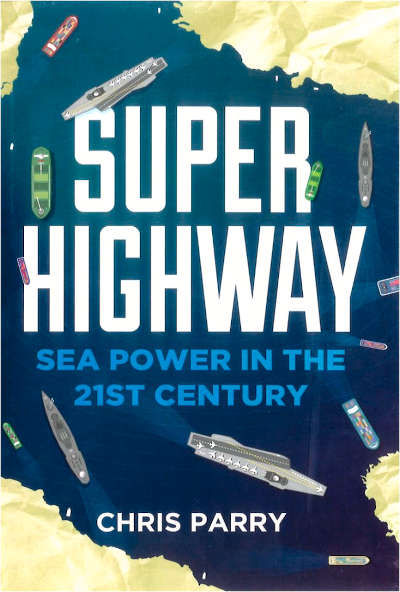In the picture
Cover of Chris Parry's book 'Super Highway. Sea Power in the 21st Century' (London: Elliott and Thompson, 2014) 360 pp.
The maritime component is often seen as a complementary element, often a minor one, to geopolitics, when in fact it is at the heart of it. Not only does the projection of power and influence, in order to be global and reach distant parts of the planet, have to be made through the oceans - the great connectors between countries and continents - but the survival of nations depends on direct access to resources that reach them above all by sea. Maritime power is much more than naval power, a military aspect to which it has sometimes been limited: it is all the effort that a state (or business) carries out at sea for its benefit. This is how Chris Parry, Oxford professor and British rear admiral, defines it in 'Super Highway. Sea Power in the 21st Century', a book that addresses the four elements that he considers to be characteristic of maritime power: control and internship of international trade; use and control of ocean resources; the operation of naval forces in war; and the use of navies and economic power (trade through the sea and ocean resources) as instruments of diplomacy, deterrence and influence in peacetime.
Since Columbus' voyage to America, in fact, every century has been maritime. Progressive globalization would not have been possible without a constant acceleration and expansion of communication across the oceans. However, the agglomeration of population on the coast (three quarters of the planet's inhabitants live less than 160 kilometers from the coast) and the depletion of many natural resources on land are causing nations to pay even more attention to the sea today. Parry does not dispute that the Earth may be flat today, if one looks at the transaction of virtual goods, but he argues that, in terms of trade in physical goods, the Earth is still as round as ever, with the seas even more in the middle than ever (if we adopt the new map of placing Asia on the left and America on the right, the space is taken up by the blue of the vast ocean).
Parry predicts that in the coming decades there will be greater activity by each country in its exclusive economic zone (EEZ), with a "progressive territorialization" of the same - not 'de jure', but 'de facto' - so that these exclusive economic zones will become more like 'exclusive zones', in which states will try to exercise their sovereignty and limit the activities of other states in them. One of the activities that will presumably be carried out, according to the author, will be the laying of electricity grids between countries or connecting distant corners of a country by sea, which will require their jealous guardianship. Thus, free navigation may be limited in many places, forcing maritime routes to be through certain corridors, as is the case with air traffic. This is what is referred to at degree scroll of the book, 'Super Highway': highways that will mark navigation and whose dominion or control will be the object of struggle between the superpowers.
In its publication ten years ago, the book foreshadowed a dynamic that has only become more pronounced, such as Beijing's aspirations in the South China Sea or Russia's in the Arctic. Parry anticipated that the great maritime issue of the coming decades will be whether or not the principle of freedom of the seas will prevail in the face of claims made by states to their nearby sea (or even to some offshore location where they promote mining activity). In his view, the 21st century will see a continuing tug-of-war between countries due to the need - in the face of population pressure, human expectations and resource imbalances - to exploit the resources of the sea. The sea "will become more crowded and its use more contested," warns Parry.
The author does not envisage a particularly negative future, as he considers that there will continue to be a great deal of international cooperation, given that most countries are interested in having rules that ensure global transit (they are more concerned with preserving their own unrestricted access than with denying access to others). However, it is possible that, if some actions of occupation of space go unchallenged, they will eventually be legitimized and even incorporated into international conventions. Given the costs of a war of expansion on land, Parry sees it as more feasible for states to "steal land" at sea.
If since the middle of the last century the security of navigation in the oceans was guarded by the naval force of the United States, today the maintenance of security can no longer be exercised by a single power. China's practices with a growing fleet demand that freedom of transit be guaranteed by a coalition of the willing hand in hand with the United States, if this country wants to continue to benefit from the control of the globalization machine.

